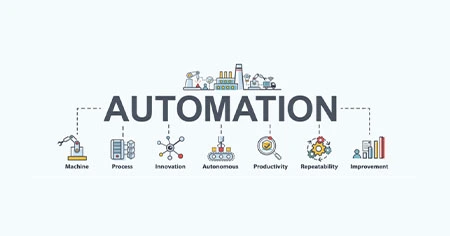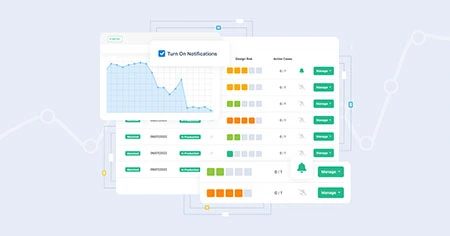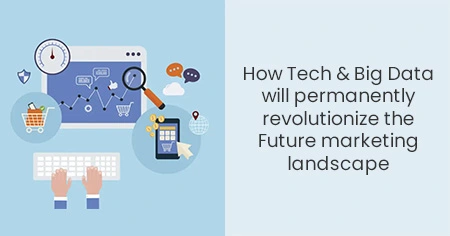Developments in fields such as Tech & Big Data have allowed businesses to create more effective targeted marketing campaigns than before.
Technology and data are not only fueling today's marketing, but they're also taking it to hyperspace. This is one of the most significant changes to the marketing landscape since the invention of the smartphone.
Yet, technology's impact on marketing roughly equates to creating ten phones simultaneously. Mobile app development, cloud computing, big data, self-service analytics tools, social media platforms, sophisticated machine learning, and various other technologies are all taking place simultaneously and building on each other. This article will discuss How Tech & Big Data permanently revolutionize the Future marketing landscape.
Understanding Big Data and Tech in Marketing:
In today's digital age, data is the lifeblood of successful marketing campaigns. The vast data offers valuable insights into customer behavior, preferences, and trends.
The global big data analytics market is expected to reach $745.15 billion by 2030, up from $271.83 billion in 2022.
How tech and Big Data have changed digital marketing:
Big Data is important in marketing because it enables marketers to understand their prospects' behavior and intentions. The global trend of predictive analytics has taken over many industries, including marketing. By 2022, the predictive analytics market will be worth $10.95 billion.

The high demand for predictive analytics, combined with the ever-increasing amounts of data generated, necessitates the development of new data analysis approaches and technologies.
According to Chiefmartech, in the marketing field alone, Big Data has given birth to 8,000 different solutions that leverage marketing processes in various domains, including:
- Advertising and promotion.
- Content and experience
- Social and Relationship
- Commerce and sales
- Data management
With an increasing reliance on mobile technology in marketing, managing digital resources efficiently has become critical. Strategies like Mobile Device Management (MDM) and Mobile Application Management (MAM) play essential roles here. Understanding how to leverage MDM and MAM can bolster data management efforts, ensuring that enterprises handle customer insights securely and effectively.
10 ways tech & Big Data will permanently revolutionize marketing in the future:
- 'Know Your Customer' (KYC)

"Know your customer" is a widely used marketing phrase today. Big data in digital marketing provides a comprehensive understanding of your target audience.
Customers' data could be collected in various ways, including information available in local CRM systems and online cookies. In the first case, you can examine your current users' profiles to determine the most common age group, ethnicity, and other characteristics—such parameters help you understand the audience you are targeting in a specific market sector.
- Product improvements
Given that the online environment provides a unique opportunity to collect and analyze data quickly, customers' perceptions of products can be understood immediately. For example, you could set up a poll on your website or send a questionnaire to customers to learn more about the products they use. Based on the results, you can add highly requested features to the product or make changes to meet the customers' needs.
- Audience Engagement

The power of tech and big data analytics is that they reveal where most of your customers come from. Customers may prefer interacting with your brand through Instagram, direct website visits, or another platform.
- Personalization at the forefront
Personalized marketing is becoming increasingly popular and is here to stay. Companies increasingly use data to tailor their marketing campaigns to specific customer preferences. With advances in artificial intelligence (AI) and machine learning, we can anticipate even more precise and effective personalization in the future.
- Real-time Data
Some businesses need real-time data from IoT sensors or GPS services. Such data reveals how well the company's products work and whether customers' expectations are met. This information could be useful for the digital marketing team, product development, quality assurance, and other departments. Address standardization plays a critical role here, ensuring that customer location data is accurate and consistent, which enhances the effectiveness of location-based marketing strategies.
- Automation

Big data tools can improve internal efficiency and operations by automating processes. Real-time data is immediately analyzed and integrated into business processes, resulting in more efficient decision-making. Data collection and storage can be automated using scalable IT infrastructure, aided by lower cloud computing costs.
- Enhancing customer understanding

Big data allows businesses to understand better their customer's preferences, behaviors, and purchasing patterns.
By analyzing large datasets and segmenting their target audience, marketers can identify trends and tailor their marketing campaigns to suit them. This enables more personalized and targeted messaging, increasing customer satisfaction and conversion rates.
- In-depth insights
Big data allows for comprehensive analysis of large data sets, revealing previously unknown opportunities for organizations. Businesses can use big data sets to map complex patterns, develop new products, and identify emerging trends, expanding the competitive landscape.
- Predictive analytics and market trends

Big data enables marketers to forecast future trends and consumer behavior by leveraging historical data and real-time analytics. By utilizing Sales Forecasting Software, businesses can apply predictive analytics to anticipate market demand, optimize pricing strategies, and uncover potential growth opportunities.
This proactive approach gives marketers a competitive advantage, allowing them to stay ahead in a dynamic and ever-changing market landscape.
- Faster and better decision-making
Thanks to data analytics technology's speed and ability to explore new data sources, businesses can now analyze information and make informed decisions in real-time. This gives them a competitive advantage and encourages growth and innovation.








